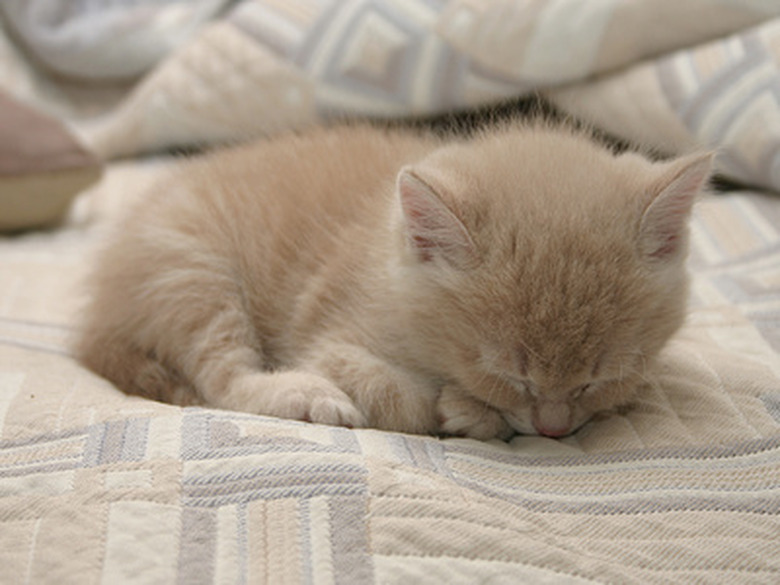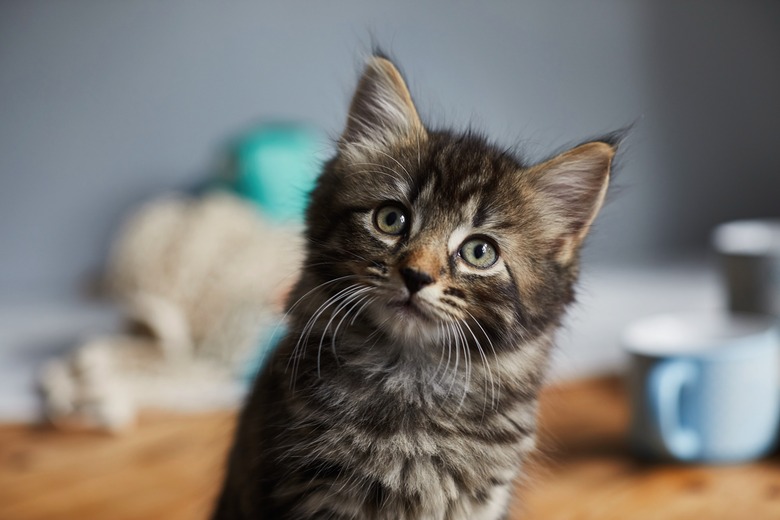How To Get Rid Of Fleas On Young Kittens
Fleas can cause major health problems for kittens, like anemia and tapeworm infestations, but not all flea treatments available are safe to use on such young cats. Don't worry, though — there are some kitten-safe treatments available to get rid of those pesky fleas even when dealing with newborn kittens.
Most medications are typically safe to use starting at around 4 weeks of age depending on your kitten's size, but you can also use some natural treatments that won't harm your kitten at all. Discover which treatments will work best for your kitten to get rid of the fleas on her coat.
Flea bath for kittens
Flea bath for kittens
The easiest and safest way to rid young cats of fleas is to give them a flea bath using dish soap. Dish soap breaks down grease, and because of this, it can break down the waxy exoskeleton of any adult fleas on your kitten's coat, causing the pests to suffocate in the water.
To create a flea bath for your little kitten of any age, simply fill your kitchen sink with an inch or two of warm water and place the kitten inside the sink. Once you've wet the kitten's fur, use a dime-size amount of dish soap to lather up the entire coat. Rub the soap into the legs, feet, tummy, tail, and back of your cat, avoiding his face. Allow the soap to sit for a few minutes before thoroughly rinsing the kitten with warm water.
Removing fleas on young kittens
Removing fleas on young kittens
After a bath in dish soap, you'll want to ensure that you've gotten all of the fleas off your kitten's coat. You can do this by brushing through your kitten's damp fur with a flea comb just after the bath.
To keep the fleas from jumping off the kitten, rub a bit of petroleum jelly on the comb. This will ensure that the fleas stick to the comb. Then, dip the comb in a cup of hot water with a few drops of dish soap in it to kill any fleas you find.
Oral kitten flea medicine
Oral kitten flea medicine
For kittens who are at least 4 weeks old and 2 pounds in size, you can safely give them an over-the-counter oral medication called Capstar. The active ingredient in this oral medication is nitenpyram, and it is considered safe for kittens and nursing mother cats. This is important because you should treat both the kitten and the mother as well to avoid reinfesting the little ones.
Keep in mind that nitenpyram only kills adult fleas and will not continue to kill the fleas after you feed it to your kitten. For this reason, you will need to clean your kitten's environment of fleas after treatment and recheck your little one for fleas daily.
Topical kitten flea medicine
Topical kitten flea medicine
Once your kitten is at least 8 weeks old, you can use a prescription topical medication such as Revolution, whose active ingredient is selamectin, to kill off any fleas and mites on her coat. Another option is Frontline Plus for Cats & Kittens, which is available over the counter and contains both fipronil and (S)-methoprene. This medication kills fleas and is also used as a cat lice treatment.
To apply either medication, you simply squeeze it onto the skin between your kitten's shoulder blades and allow it to sit on the fur. You can also use either medication on the mother cat even if she's still nursing. Best of all, these medications will continuously protect your kittens from becoming reinfested with fleas because they kill adult fleas and prevent flea eggs or larvae from developing.
Fleas in the environment
Fleas in the environment
After washing, combing, or treating your kitten for fleas, your next step is to get them out of his environment. Do this by vacuuming all of the areas where your kitten has been and wash his bedding in hot water. Dispose of your vacuum bag or empty and wash out the vacuum canister with hot, soapy water for bagless models. For severe infestations, you may need to consult with an exterminator to have your house professionally treated.


